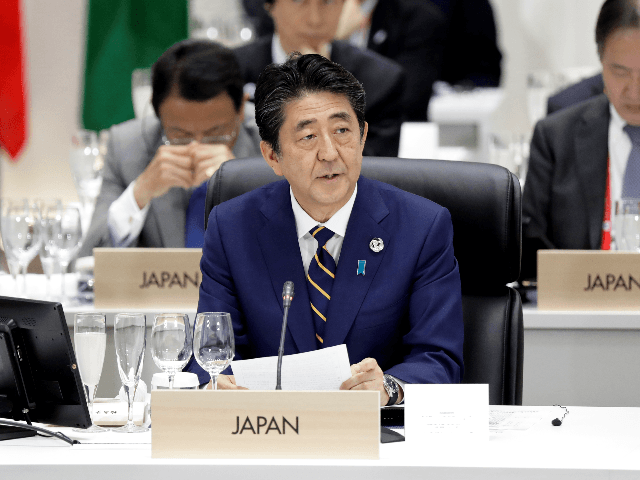Despite China’s demands that Hong Kong not be discussed in any way at the G20 summit in Osaka, Japanese Prime Minister Abe Shinzo confronted Chinese Communist Party chief Xi Jinping on Thursday over China’s human rights abuses and told him “a free and open Hong Kong” must be allowed to “prosper under the ‘One Country, Two Systems’ policy.”
Japanese officials said Abe stressed the importance of “guaranteeing freedom, human rights, rule of law and other universal values” during a meeting on Thursday ahead of the G20 kickoff.
Abe also criticized China’s persecution of the Uighur Muslims in Xinjiang province during his meeting with Xi, according to Japanese Deputy Chief Cabinet Secretary Yasutoshi Nishimura.
Abe signaled before the meeting that he intended to welcome Xi warmly and pursue improved relations between Japan and China, and perhaps conduct a little advance diplomacy before Xi meets with U.S. President Donald Trump on Saturday. Abe publicly extended an invitation to Xi to visit Japan next spring, “when the cherry trees are in blossom,” so the two leaders could “raise Japan-China ties to the next level.”
However, Abe made it clear he would discuss unfair business practices, China’s militarization of the South China Sea, and Chinese attempts to annex disputed islands during his meeting with Xi. His decision to discuss Hong Kong directly contradicted Chinese orders that it would allow no discussion of Hong Kong and its massive pro-democracy demonstrations during the G20 event.
CNN credited Hong Kong’s intrepid demonstrators with helping to inspire Abe’s conversation with Xi. Activists were able to stage demonstrations in both Osaka and Hong Kong, connecting them with a live video feed. Their campaign to finance full-page advertisements in newspapers of the G20 countries exceeded its fundraising goals and was able to place ads in at least ten international papers.
Activists told the Hong Kong Free Press they were delighted by Abe’s support for their cause. The activists said:
Nineteen-year-old university student Vivian Yuen Ching-yan told HKFP she welcomed Abe’s comments and hopes it will spur more world leaders to raise similar concerns.
“I hope the international community can also put pressure on the Hong Kong government to actually respond to our demands, instead of giving bullshit excuses,” she said.
Gigi Tang, a 22-year-old university student, also said she hopes Abe’s comments will influence more world leaders to speak out about Hong Kong.
“Of course it is welcomed. His opinion is more powerful than two million Hong Kong people coming out to protest,” she said. “I hope the [newspaper] campaign will raise awareness not just with world leaders but people across the world.”
Andy Chan Ho-tin, founder of the banned pro-independence Hong Kong National Party, thanked Abe for discussing the issue with Xi and said he is “looking forward to other leaders doing the same and speaking up for Hong Kong people.”
The Hong Kong contingent in Osaka found allies in activists for the Uighurs and Tibetans, appearing in support of each others’ demonstrations as the G20 summit got underway. Chan, in fact, expressed his thanks to Abe in a press conference held by the Free Indo-Pacific Alliance, a group representing oppressed and exiled minorities that is currently headed by the former president of the World Uighur Congress.
The group has organized rallies and marches against China throughout the G20 summit. In addition to respect for Hong Kong’s autonomy and closing the infamous re-education camps of Xinjiang province, the Free Indo-Pacific Alliance wants China to stop threatening military action against Taiwan.

COMMENTS
Please let us know if you're having issues with commenting.